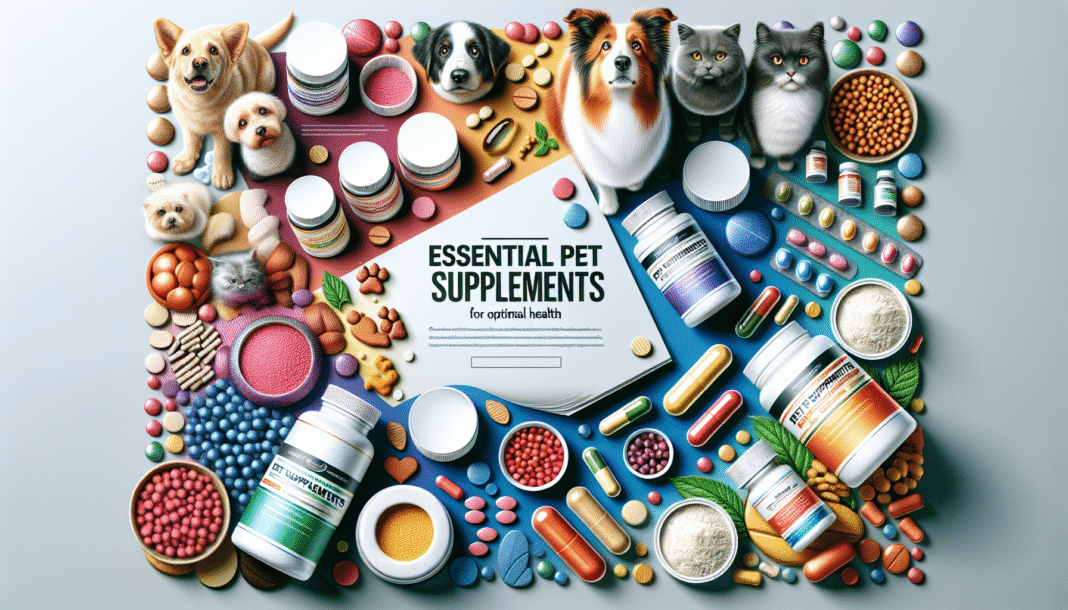As pet owners, ensuring our furry companions lead healthy and happy lives is a top priority. Just like humans, pets can benefit from supplements that support their overall well-being. This guide explores essential pet supplements, covering their benefits, common types, and practical tips for choosing the right ones for your pet.
Understanding the Need for Supplements
Why Supplements?
Pets, like humans, require a balanced diet to thrive. However, many pets may not receive all the necessary nutrients from their regular diet. Factors such as age, health conditions, and dietary restrictions can contribute to nutrient deficiencies. Supplements can help fill those gaps, promoting optimal health and preventing issues before they arise.
Common Signs Your Pet Needs Supplements
- Low Energy: If your pet seems lethargic or less playful than usual, it might indicate nutritional deficiencies.
- Poor Coat Condition: A dull or brittle coat may suggest a lack of essential fatty acids or vitamins.
- Digestive Issues: Frequent diarrhea or constipation may signal the need for digestive support, like probiotics.
- Joint Pain: If your pet struggles with mobility, particularly in older animals, joint supplements might be necessary.
Types of Essential Pet Supplements
1. Omega Fatty Acids
Omega-3 and Omega-6 fatty acids are vital for maintaining healthy skin and coat, as well as supporting brain function and reducing inflammation. They can be especially beneficial for pets with allergies or skin conditions.
- Sources: Fish oil, flaxseed oil, and krill oil.
2. Probiotics
Probiotics are beneficial bacteria that promote gut health. They aid digestion and can help alleviate gastrointestinal issues, ensuring a healthy balance of microflora in the gut.
- Usage Tips: Look for probiotics specifically formulated for pets. Consult your veterinarian for the right strain and dosage.
3. Joint Supplements
Glucosamine and chondroitin sulfate are common ingredients in joint supplements that support cartilage health and relieve arthritis symptoms. These are particularly useful for older pets or those prone to joint issues.
- Practical Example: Consider a glucosamine supplement if you notice your dog hesitating to jump or climb stairs.
4. Multivitamins
A good quality multivitamin can provide a broad spectrum of nutrients. These are particularly helpful for pets on specialized diets, ensuring they receive adequate vitamins and minerals.
- Tip: Discuss with your vet to find a multivitamin that fits your pet’s specific needs.
5. Antioxidants
Antioxidants like vitamins C and E help combat oxidative stress, supporting overall health and longevity. They boost the immune system and can improve your pet’s vitality.
- Examples: Antioxidant-rich supplements often contain ingredients like blueberries, cranberries, and green tea extract.
Choosing the Right Supplements
Consult Your Veterinarian
Before introducing any new supplements, it’s crucial to consult your veterinarian. They can help assess your pet’s health and dietary needs, ensuring you choose the right supplements without adverse effects.
Read Labels Carefully
Look for products that are specifically formulated for pets. The label should provide clear information about the ingredients, dosage recommendations, and any potential side effects.
Research Trusted Brands
Select supplements from reputable brands with positive reviews and transparency about their sourcing and manufacturing processes. Brands that conduct third-party testing provide an added layer of assurance regarding quality.
Administering Supplements
Ease of Use
Some pets may be more receptive to supplements than others. Consider the following strategies for easier administration:
- Incorporate into Food: Mix powdered supplements into your pet’s meals or use a treat as a vehicle for administering pills.
- Palatable Options: Choose chewable or liquid formulations that tend to be more appealing to pets.
Monitor Your Pet’s Reaction
As with any new addition to your pet’s regimen, monitor them for any changes—positive or negative—after starting supplements. This includes changes in energy levels, coat condition, or digestive health.
Adjust as Needed
Over time, your pet’s needs may change due to age, health conditions, or shifts in activity levels. Regularly reassess supplementation with your veterinarian to ensure your pet continues to receive optimal care.
Prevention: A Holistic Approach
While supplements can enhance your pet’s health, they are most effective when combined with a holistic approach. Here are some additional strategies:
- Balanced Diet: Ensure that your pet’s diet is well-balanced and appropriate for their life stage.
- Regular Exercise: Maintain a consistent exercise routine to support physical health and mental stimulation.
- Routine Vet Check-ups: Regular veterinary visits are essential to catch any potential health issues early and provide guidance on nutrition and supplements.
By understanding the importance of pet supplements and how to use them effectively, pet owners can take proactive steps toward ensuring their beloved companions enjoy a long, healthy life. Committing to a comprehensive care plan, including proper nutrition, exercise, and regular veterinary check-ups, will help your pet thrive.





